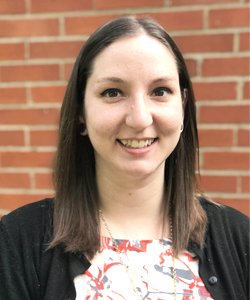Chelsea Gibbs began working in the disability field by chance and fell in love with it, which led to her pursuing a Master’s in Music Therapy and enrolling in the Human Development Institute’s Graduate Certificate in Developmental Disabilities where she’s researching the intersectionality of disability and the LGBTQ+ community.
Chelsea has a background in music education and moved from Vermont to Kentucky two summers ago. She was in the process of looking for a teaching job when she took a part time job as a Community Living Supports provider, which led her to her job at Build Inclusion, an organization created by advocates that aims to improve community access and inclusion for people with disabilities.
“We offer what’s called supported employment services,” she explained. “We help people find competitive, integrated, and meaningful employment who might otherwise be facing vocational barriers.” She’s also working toward her certification to be a customized supported employment specialist through Marc Gold & Associates.
“I took the job thinking it would be very temporary,” she said, “just a couple hours a week until I got a music teaching job, and I’m glad I didn’t get a music teacher job because that opened me up to the disability world.”
Although she loves her job, Chelsea still wanted music in her life, so she enrolled in UK’s Music Therapy Program where she is focusing on piano and guitar. Chelsea defines Music Therapy as an evidence-based practice delivered by a certified music therapist where music interventions are used to work on an individual’s goals.
For example, in schools, a music therapist helps students work on their Individualized Education Program goals. In a hospital setting, music therapists can help with relaxation, pain management, or fine and gross motor skills. Chelsea hopes to bring her skills to her job to help clients with vocational goals.
Alongside her Music Therapy studies, Chelsea is working toward a Graduate Certificate in Developmental Disabilities. As part of that program, students complete an individual research project. Chelsea is doing hers with her partner, who is a PhD. Student in the College of Social Work at UK, and they will be studying the intersectionality of disability and the LGBTQ+ community.
Specifically, they will be comparing ABA, or Applied Behavioral Analysis, with conversion therapy (the controversial practice that aims to change a person’s sexual orientation or identity) and the lack of mental health options for people who have had those interventions. Chelsea said, “Autistic self-advocates have spoken up about the harmful effects of ABA therapy, which often aims to change behaviors seen as undesirable by society. Neurodiversity is a natural and normal variation of the human genome. There is still controversy about both ABA and conversion therapy.”
Chelsea explained there is a high rate of autistic people who are a part of the LGBTQ+ community and that it’s a very specific category of people that are underserved. She went on to explain the significance of the research project:
A lot of people… don’t have that training or aren’t able to offer effective therapies for people with disabilities. And when you add on top of that also being part of the queer community, there really is just a lack of knowledge on that subject and a lack of mental health resources. [And] if you don’t have those mental health resources, how does that impact the rest of your life?
Chelsea hopes the project will eventually lead to better access to services for individuals who are a part of these populations. “I’m an advocate for the disability community,” she said, “And you can’t be quiet being an advocate. You have to speak up.”
While she is most excited about her research project, Chelsea also said, “I am very glad I signed up [for the Certificate Program]… We’ve had just an array of wonderful guest speakers to come to talk to us about literally everything in the disability community… [and] I love the diversity of the students, which I think is great because no matter who you are, you’re probably going to come across somebody with a disability.”
Between what she’s learning in music therapy courses, the certificate program at HDI, and her job, Chelsea said it’s amazing to see how everything comes together, and she feels that her entrance into the disability field was “meant to be.”
“I fell in love with it,” she said. “I was planning on getting a teaching job, but life decided something else. I’m glad it did.”
For more information about HDI’s Graduate Certificate in Developmental Disabilities, contact Dr. Phillip Rumrill at phillip.rumrill@uky.edu.
Article by Amanda Corbin, MFA
